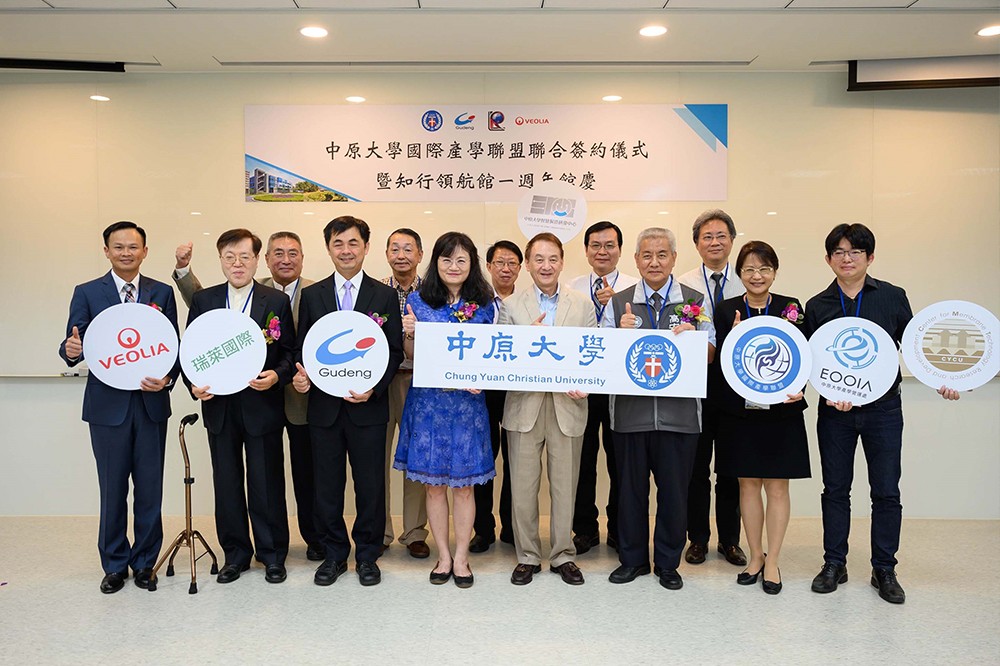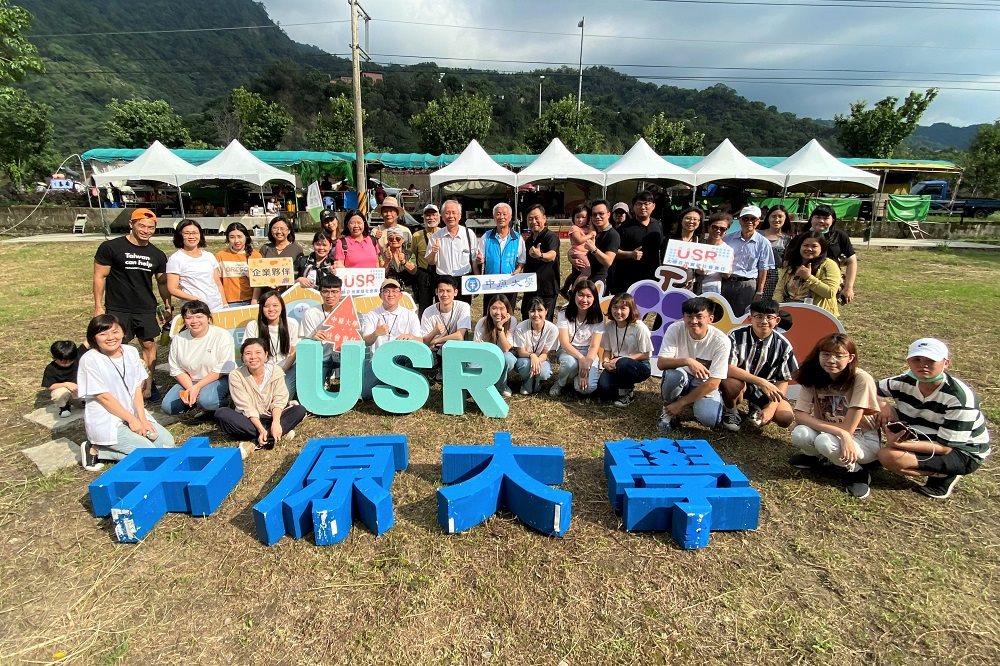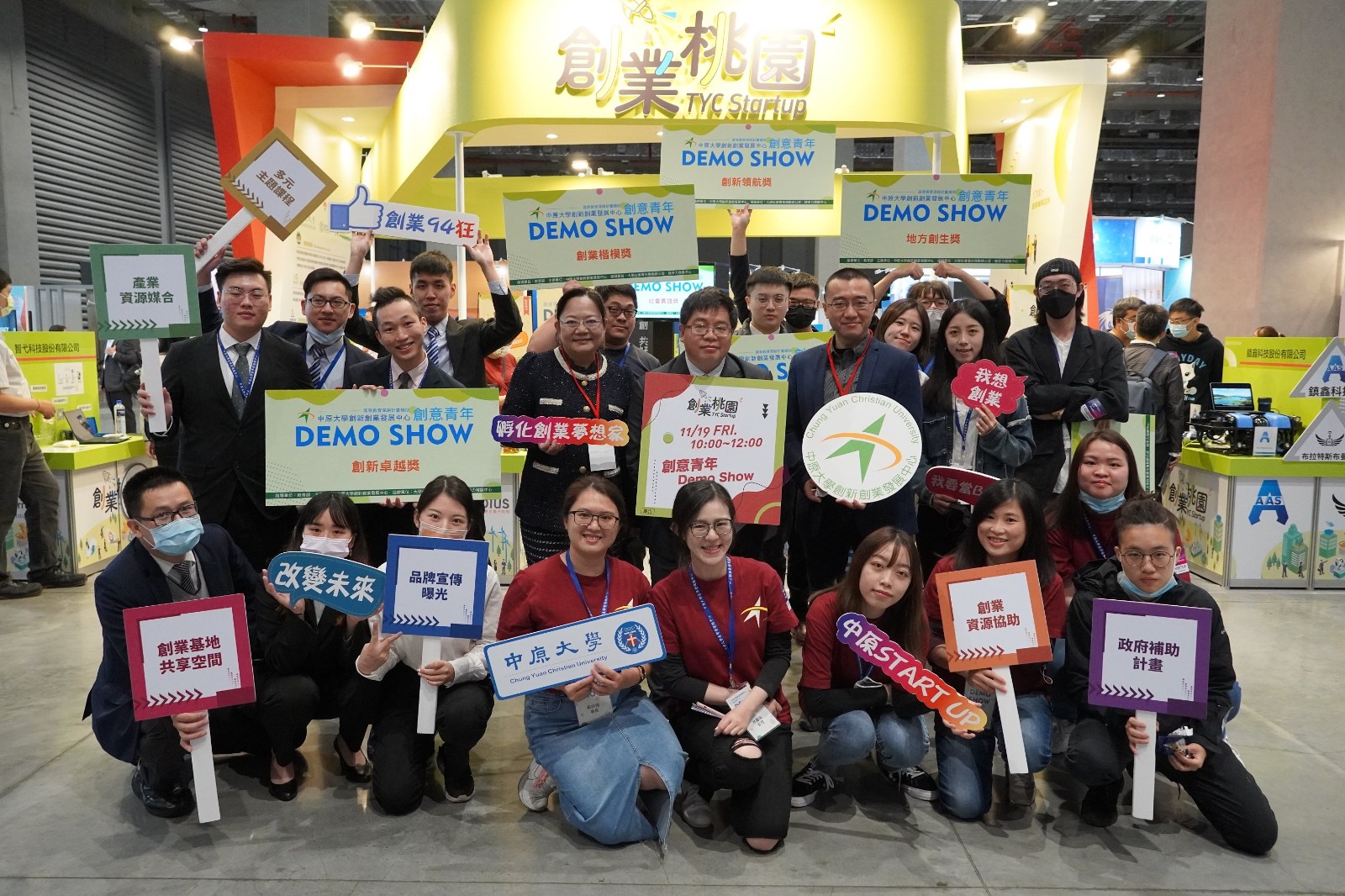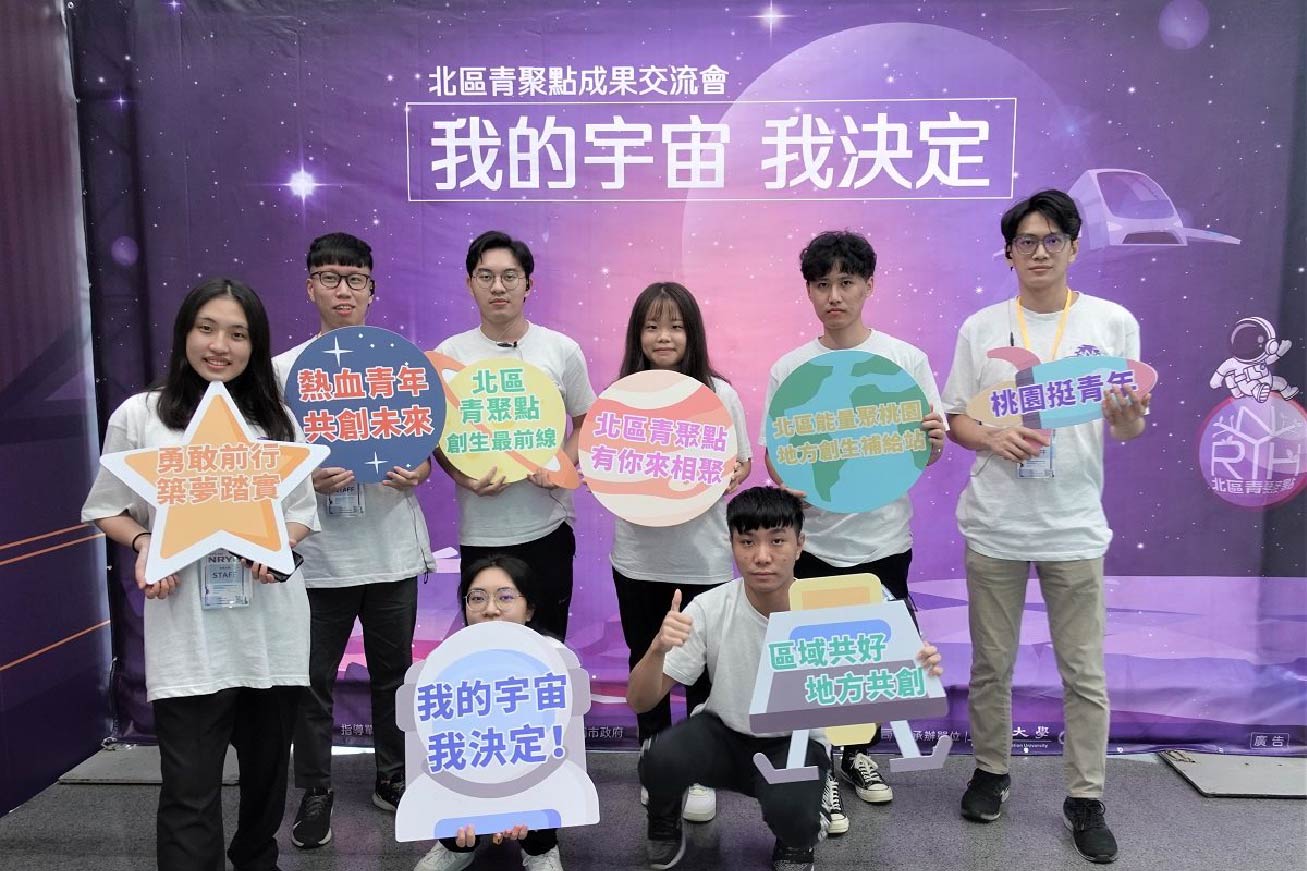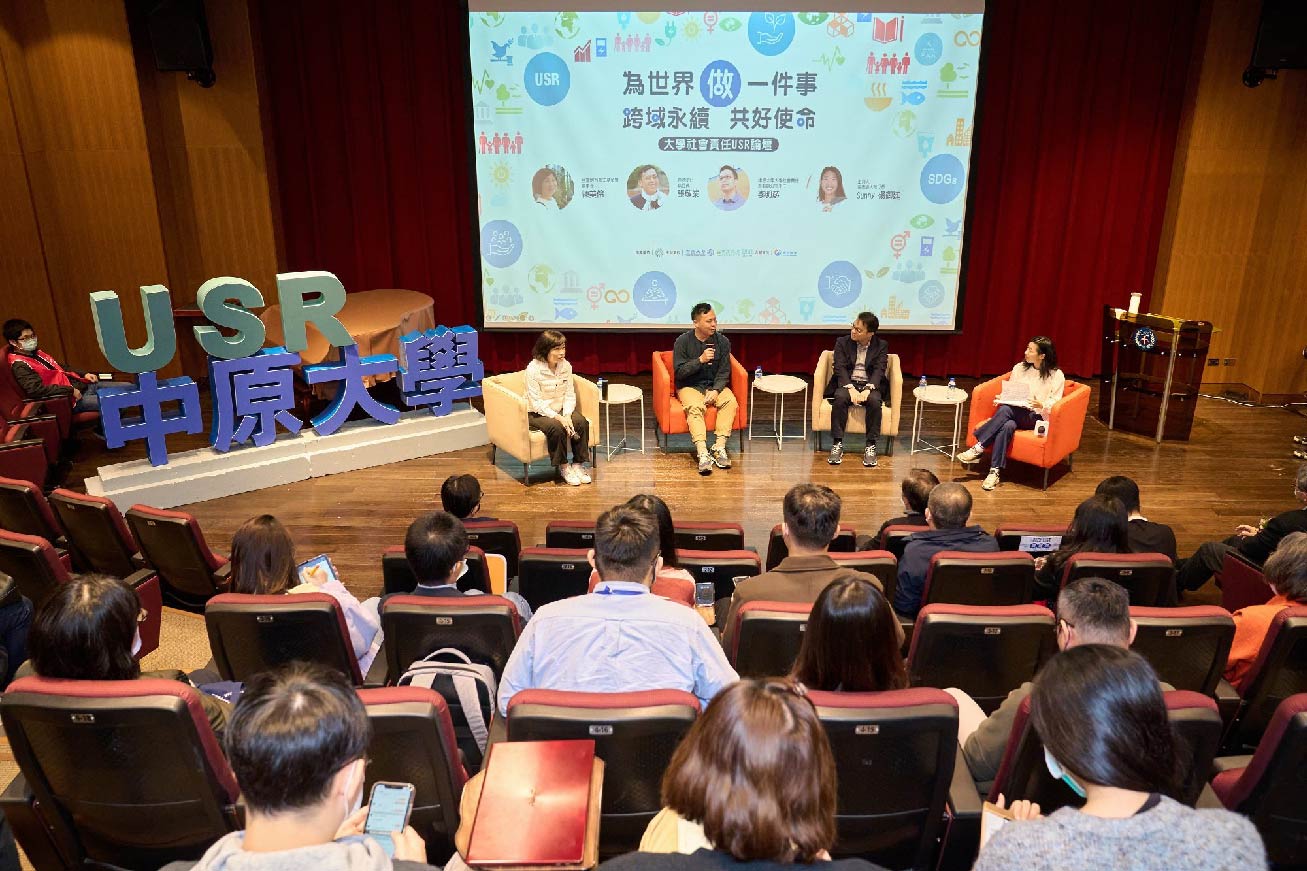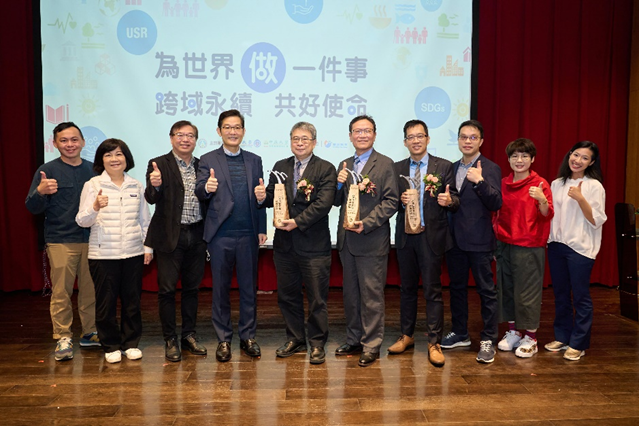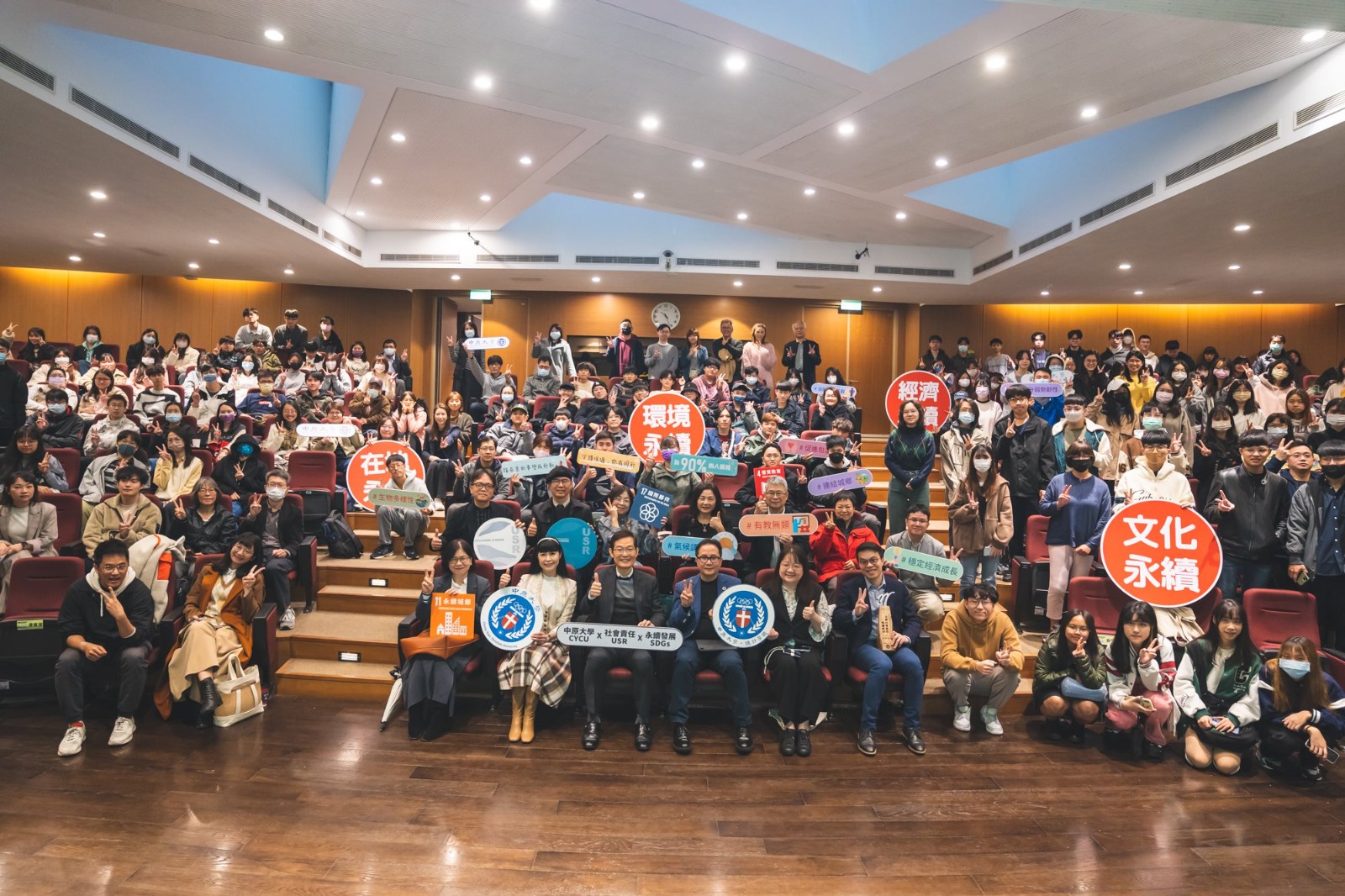Highlights of accomplishments
Abstract and Highlights of Situation for Goal Achievement
With steady and realistic footsteps, the University cultivated deeply the existing advantage in its development, stressed the integration of data analyses on the multi-dimensionality of students’ learning, accepted extensively the information of satisfaction obtained from employers to the University’s graduates, and ensured highly effective tracking of evaluation and decision-making to enhance the effective accomplishment of the goals of the Project. The mechanism for implementing the Project was done by “Joint Meetings of Higher Education Sprout Project” presided by the President of the University to develop the strategy, structure, oversight, and evaluation of the Project. While for each Sub-Project, regular group and taskforce coordinating meetings were held to make sure that the progress and outcome of implementation of the Sub-Project were well under control. Meanwhile, the University established a “Chung Yuan Higher Education Sprout Website” and issued three electronic news – “Higher Education Sprout Bimonthly Journal,” “Excellence in Teaching Bimonthly Journal,” and “Knowledge Communication Quarterly Journal (for the high-school end)” – to provide platforms for the disclosure of information. The highlights and features of implementing this Project are as follows:
1. Promote Feature-Oriented Innovative Teaching and Develop Adaptability-Oriented Autonomous Learning
To maintain a stable development of Excellence in Teaching, the University promoted colleges as the core and stressed uniqueness and professionalism for each college to take root from both the faculty’s and the student’s perspectives. From the perspective of students, based on the PDCA (Plan-Do-Check-Act) quality-assurance cycle mechanism, the University implemented tracking, oversighting, and assessing, and established “Mechanism of Accountability and Quality-Assurance for the Outcome of Student Learning” and compiled “Quality-Assurance Report on Chung Yuan Christian University’s Student Learning Outcome” which were beneficial to the optimization of quality of teaching and the enhancement of outcome of student learning. From the perspective of faculty, the University promoted the observation of innovative teaching methodology overseas; with the established ecological environment for teaching and workshop for innovative teaching, the University proliferated multiple characteristic development of implementing innovative teaching offered by those faculty who have participated in the overseas training programs.
2. Expand International Top-Notch Advantage and Nurture Innovative Industry-Academia Talents
To expand international industry-academia cooperation, the University established a Liaison Office of International Industries to (1) set up industry-academia locations in Southeast Asia to link e-commerce companies and accelerators in Malaysia, Northern Vietnam, Indonesia, etc., (2) incorporate governmental resources to enhance surveying and expanding of South-Bound international markets for interconnecting and matching Thailand’s e-commerce enterprises, venture parks, and Taiwanese businesses stationed in Thailand, and (3) build up with University’s own fund a Smart Innovative R&D Building (to accommodate the Innovation Pilot Center for Theory in Practice) and complete the establishment of smart manufacturing demonstrative production line to become the largest smart manufacturing demonstration and service site among all domestic academia; meanwhile, the governing body of Taoyuan City placed great emphasis on the CYCU’s smart manufacturing to act in concert with the Asian Silicon Valley Development Initiative to become an important platform for technological exchanges, to drive industrial transformations, to promote international cooperation, and to nurture elite talents for the Industry 4.0.
3. Develop Multiple International Cooperation and Bring Up World-Class Elite Talents
To nurture new-generation talents with advantage, the University actively established global networks, such as (1) participated in the Grand Challenges Scholars Program (GCSP) sponsored by the National Academy of Engineering (NAE) of the United States with students finished the Program being eligible to be placed on the honor roll of NAE, (2) participated in the Service-learning Asia Network (SLAN) to enhance students’ capability for international service-learning, and (3) participated in FutureLearn for international Massive Open Online Course (MOOC) to expand the University’s high-quality international courses and to provide opportunities for students to take courses offered by international prestigious universities. In addition, the University held the CYCU Week of Academicians from World Renown Universities and the Global Partner University Expo and Forum, along with signing multiple-university alliance agreements, to increase the channels for students to participate in international exchange programs. Moreover, the University and Temple University of the United States jointly established Dual-Degree Undergraduate Degree-Program in Business Management for students to obtain two bachelor’s degrees on graduation from both universities. Furthermore, the University, University of Wisconsin-Milwaukee (UWM), and Hon Hai’s Foxconn New Plant of the United States signed a 3-year Institutional Co-Op Educational Cooperation Program to provide the students from UWM with the opportunities to come to CYCU for their exchange studies and for doing internship at the Foxconn plant site. Through these multiple international exchange and collaboration programs, the University enhances its students’ international mobility.
4.Do Well on University Social Responsibility and Implement Promotion of Knowledge Responsibility
With the spirit of “Holistic Education,” the University encouraged both the faculty and students to bring forth teaching across curriculum and social practice through service learning, taking root at the Greater Taoyuan area and the Taoyuan-Hsinchu-Miaoli area, regarding location creations, regional characteristics, and cares for the underprivileged, through a new mindset of “learning by creativity” to promote knowledge responsibility of the practice of social design. The University also set up “CYCU Knowledge Responsibility Fund” and called for the enterprises, public interest groups, governmental organizations, and mass media to form the “CYCU Practice Alliance for Knowledge Responsibility,” using professional knowledge, technologies, and capabilities through connections and cooperation of resources to systematically push forward knowledge responsibilities, promote local developments, and unleash the university knowledge responsibilities and influences.
|
|
Abstract and Highlights of Situation for Goal Achievement
The Project, as a whole, merged with the National Development Policy together with the Educational Policy to implement University’s Educational Philosophy and to use University’s Affairs Development as the planning guidelines; this Project, with feedback to the Project, conducted project research to press ahead, using effectiveness of student’s learning, the opinions obtained from internally and externally interactive persons, and the information obtained from the Project’s results and their evaluation outcome. The mechanism for oversight and evaluation of the Project was done by “Joint Meetings of Higher Education Sprout Project” presided by the President of the University on a periodic basis to comprehensively review the progress and results of implementation of the Project; meanwhile, the University established a “Chung Yuan Higher Education Sprout Website” and issued three electronic news – “Higher Education Sprout Bimonthly Journal,” “Excellence in Teaching Bimonthly Journal,” and “Knowledge Communication Quarterly Journal (for the high-school end)” – to provide platforms for the disclosure of information. The highlights and features of implementing this 2020 Project are as follows:
1. Cultivate Student’s Professional Capability for Narration and Promote Talent Education on Artificial Intelligence (AI)
In response to the National Development Policy and the industrial demands, expected to accomplish two goals – “Cultivating Student’s Professional Capability for Narration” and “Strengthening Talent Education for Core Industries” – a University-level workshop of teaching and learning on capability for narration was established to publish “Reading Strategies: Secret for Instant Combating Power of Capability for Narration,” merging the literacy cultivation of fundamental and professional capabilities for narration into general-education, professional, and capstone courses, with the goal to accomplish student’s professional capability for narration. For the aspect of “Strengthening Talent Education on Core Industries,” the Project focused on the task of talent education on AI. For the aspect of teaching development of teachers, besides collaborating 14 full-time faculty members to publish a book on “Introduction to Artificial Intelligence,” an Enhanced Training Program on AI for the Teachers was developed in cooperation with AI ROBOT at the Tainan Science Park.
For the aspect of student’s education, AI was merged into the fundamental general-education courses – “Introduction to Natural Science,” “Engineering and Science,” “EECS and Human Civilization,” etc. In addition, the number of the practice-oriented teaching facilities was increased to strengthen the University-level AI professional practice classrooms, with the expectation that these facilities would enhance the student’s knowledge and practical abilities.
2. Cultivate Deeply the Key and Top-Notch Areas and Educate Innovative Industry-Academia Talents
Acting in concert with the focal points for pressing ahead of the National Development Plans with multiple and deep cultivation of the University’s key and top-notch areas, in the area of smart manufacturing, the University in collaboration with the Gudeng Precision Industrial Co., Ltd, established the “R&D Center for Smart Manufacturing of Semiconductor Carriers,” with the Chih Hsing Innovation Hall as the base, to carry out advanced research on technological transformation. Moreover, to establish a new initiative of quantum computation, the University published the first college textbook on quantum computation and purchased quantum-computation related facility to become the first university in Taiwan with a room-temperature quantum computer. In the area of the development of membranes, funds were raised to build the “R&D Building for Membranes and Circular Economy” and to set up the industry-academia integrated laboratories. So far, Memoranda of Understanding (MOUs) with a number of companies were signed to establish such integrated laboratories, providing the funds for prospective development membrane researches on “Treatment of Sustainable Water,” “Green Energy,” “Biochemical Separation,” etc. Furthermore, acting in concert with the Asia Silicon Valley Development Agency of Tauyuan City, the University became an important technological-exchange platform, driving industrial transformation and cultivating innovative industry-academia talents.
3. Love under Pandemic Condition and Educate and Care without National Frontiers
As a result of global coronavirus disease-2019 (COVID-19) pandemic, to ensure the effective learning outcome of teaching, nearly 3,000 courses had been uploaded onto the online teaching platform, providing normal teaching without being affected by the pandemic. The newly established “Special Implementation Program for Students Encountering Family Misfortune Resulting from COVID-19 Pandemic” allowed the University to provide numerous assistances in epidemic prevention measures throughout the process for the incoming foreign students, letting them study with peace of mind. In addition, to promote international mobility and exchange, the University expanded the multiple learning models and formally participated in the FutureLearn International MOOC (Massive Open Online Course) Platform, uploading online the pre-recorded all-English course(s) made by faculty of the University in 2021 – emphasizing the establishment of “International MOOC Platform” and planning to set-up “College’s Self-Study Alliance Via Network” and “International Cloud Academy,” encouraging faculty and students to participate in the online international exhibition and competition activities to make known of the University’s R&D accomplishments.
4. Link Organizational Multiple Cooperation and Carry Out Promotion of Knowledge Responsibility
To carry out the social responsibility and influence of the University, domestically, the University worked with the City Government of Tauyuan regarding the related resources for sustainable development to bring forth and to integrate the field space for regional revitalization of the Tauyuan’s 7 administrative districts in the training of 13 Youth Revitalization Teams, letting the University become the promoter of the Greater Tauyuan area development and regional revitalization. Furthermore, for the international exchange and collaboration, the University implemented “International University’s Social Responsibility (USR) Experience Camp,” leading multiple- international students to participate and to know the landscape, the history, and the spirit of USR for Tauyuan. Meanwhile, the University worked with the UCSI University in Malaysia to bring forth the development of transnational regional revitalization organizations, cooperatively offering courses via remote videos.
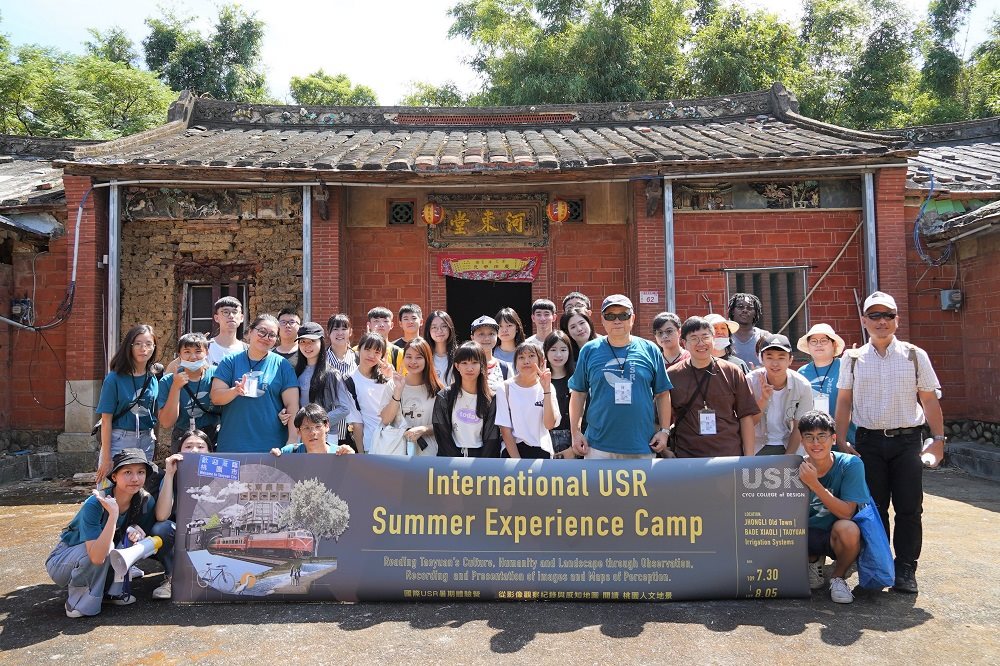 | 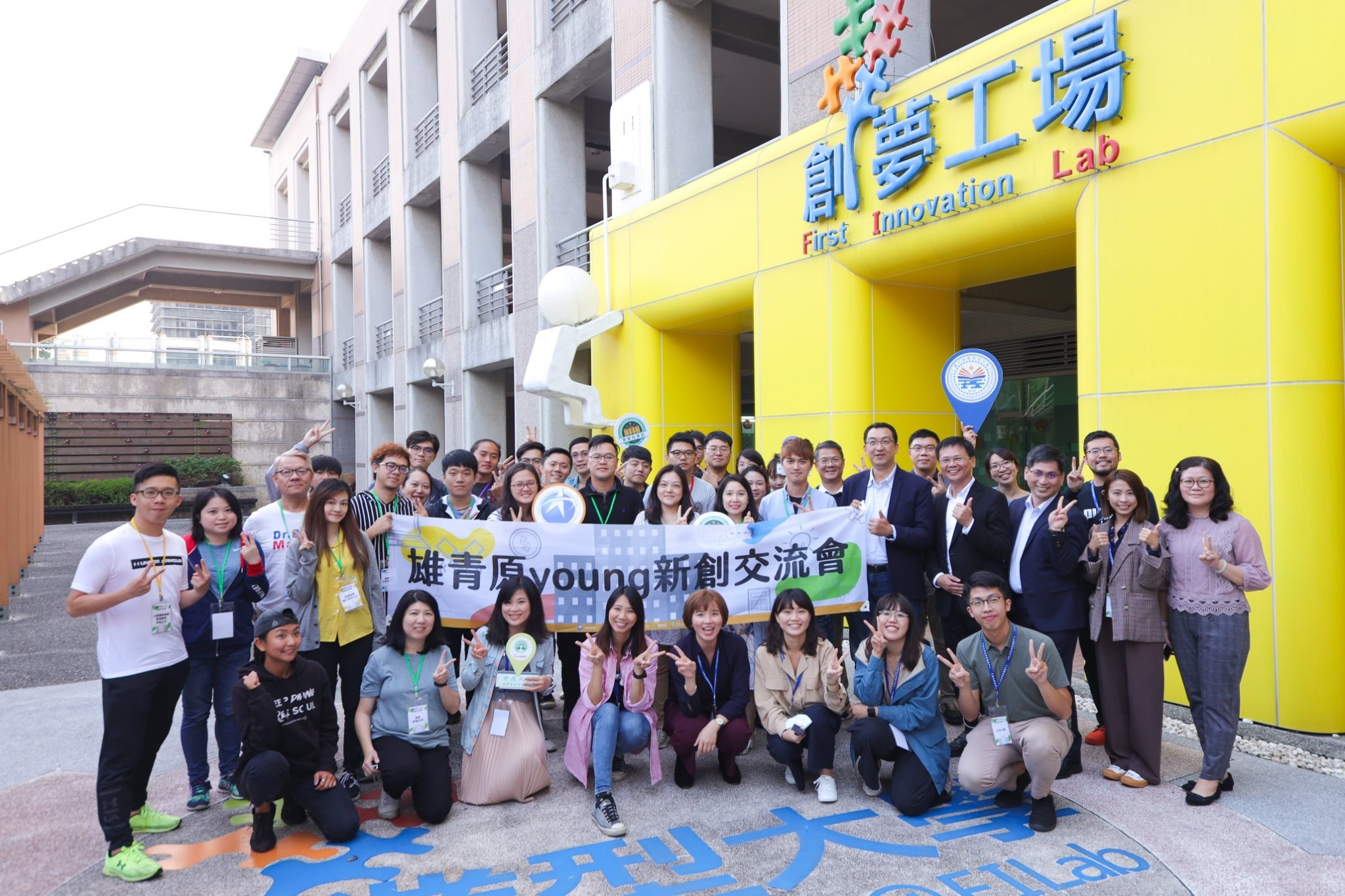 |
Abstract and Highlights of Situation for Goal Achievement
The planning policy for the Overall Project merged national development and educational policy, along with implementation of the University’s educational philosophy and its developmental plan. In the meantime, the feedback and promotion of the Project incorporated the learning effectiveness of students, the opinions of interactive stakeholders – both interior and exterior, and the Project’s institutional research was based on the data obtained from Project’s results and evaluations. The mechanism for implementing the Project was done by “Joint Meetings of Higher Education Sprout Project” presided by the President of the University to comprehensively review the progress and effectiveness of the Project’s implementation. In addition, the University’s website set up an “Information Platform for the University’s Affairs” and a “Chung Yuan Higher Education Sprout Website,” and issued three electronic news – “Higher Education Sprout Bimonthly Journal,” “Excellence in Teaching Bimonthly Journal,” and “Knowledge Communication Quarterly Journal (for the high-school end)” – to provide platforms for the disclosure of information. The highlights and features of implementing this Project are as follows:
1. Strengthen Autonomous Learning for Students and Optimize Smart Power for Them
Per the policy objectives of the Ministry of Education issued in 2021, two objectives were “Strengthening Autonomous Learning for Students" and “Optimizing Smart Power for Students.” For the former, besides optimizing digital learning platform – C-Learning – the University established the International Cloud Academy, linking with numerous platforms for international cloud courses. In addition, starting from September 2021, the University promoted recognition of the credit system for professional autonomous learning. For the latter, the University pushed forward for the three-stage “Cultivating Basic Abilities,” “Developing Application Technologies,” and “Utilizing Professional Practice” for the course structure associated with the talent education to enhance students’ “narrative capability,” “English proficiency,” and “technological competency.” Moreover, the University promoted study programs regarding sustainability development to facilitate student’s understanding of the United Nations’ Sustainability Development Goals (SDGs), nurtured student’s capabilities for solving future trend issues, and through cultivating student’s hard power and soft power, expected them to possess the smart power to meet the needs of workplace employment.
2. Promote Key State-of-the-Art Fields and Nurture Cutting-Edge Industry-Academia Talents
The University promoted continuously its key state-of-the art fields – for utilizing membrane technology to the medical field, the R&D Center for Membrane Technology integrated collaboratively with the University of Tokyo, Japan, the University of Akron, the United States, and the University of Toulouse, France, on the inter-collegiate, interdisciplinary cooperation in scientific researches to develop the research on utilizing membrane for precision medicine and disease control, enhancing the R&D capability in the featured field of biomedical membranes. For the smart manufacturing field, the University carried out technical cooperation with the Engel Austria GmbH, a leading injection molding equipment vendor in the world, assisting the Company in designing molding-stabilization modules to be incorporated in the injection molding machine, and in the meantime, promoted such an innovative injection molding technology collaboratively, letting the participating students cumulate such a professional skill and possess global point of view and competitiveness. Moreover, the University developed quantum computing technology, offered courses such as Practical Platform for Quantum Computing and Algorithms for Quantum Computing, supported the training of high-school seeded teachers for quantum computing PLC (programming logical controller) in Taipei and Taoyuan, and, in 2022, planned to hold seminars on quantum computing education, letting more high-school and university teachers participate in such training in Taiwan and striving continuously for the University’s featured instructional items of quantum-information talent cultivation.
3. Establish Learning Foundations to Link-Up EMI (English as a Medium of Instruction) for Diversified Multi-Track Bilingual Layout
The University has formally joined the Association of Universities of Asia and the Pacific (AUAP), a non-profit organization with the highest advisory status in the UNESCO (United Nations Educational, Scientific, and Cultural Organization), to develop a cooperation model for multiple teaching beyond the borders; to set up programs and activities such as “International Elite Interdisciplinary Program,” “Introduction to Global Culture,” counseling mechanism for all-English professional courses, over 170 sessions of foreign-language learning courses and activities merged into student’s bilingual learning environments; to establish the Office of Promotion for Student’s Bilingual Proficiency to integrate horizontally the multiple-year outcomes and resources derived from the Higher Education Sprout Program, enhancing the teaching proficiency associated with all-English teaching for the teachers, and setting up student’s complete academic portfolios before and after their enrollment to analyze the effectiveness of universal enhancement in their English proficiency.
4. Unleash University’s Impact on Social Responsibility from Regional Revitalization to International Linkage
The University continuously cultivated in depth the Taoyuan City’s “Action Plan for the Youth to Devote to Sustainability Development,” expanded the service domains to seven cities and counties in northern Taiwan for action of empowerment at the “Youth Gathering Spots,” co-organized “Taiwan Regional Revitalization Annual Meeting” with Taiwan’s model revitalization teams, called out over 150 regional revitalization teams and 15 private enterprises to share and learn collaboratively, and deepened the University’s impact on social responsibility. In addition, the University Social Responsibility (USR) Project worked in depth with the UCSI University, Malaysia, and Community Development Schools, Japan, to carry out online workshops and exchange courses, linking with international organizations to promote cross-border collaborations.
| 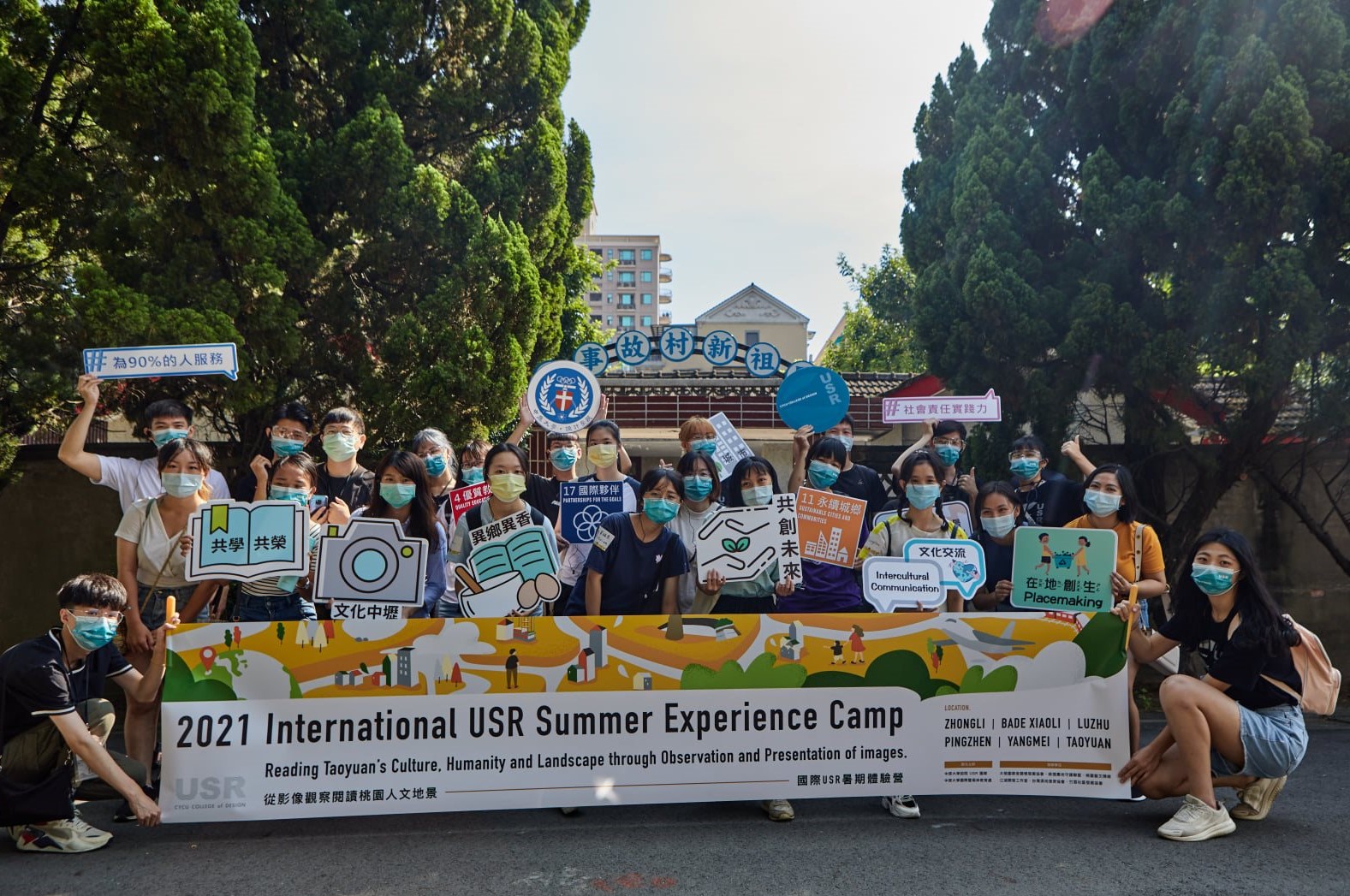 |
Abstract and Highlights of Situation for Goal Achievement
The planning policy for the overall Project merged with national development and educational policy and implemented the University’s educational philosophy and its developmental plan. In the meantime, the feedback and promotion of the Project incorporated the learning effectiveness of students, the opinions of interactive stakeholders – both interior and exterior, and the Project’s institutional research was based on the data obtained from Project’s results and evaluations. The mechanism for implementing the Project was done by “Joint Meetings of Higher Education Sprout Project” presided by the President of the University to comprehensively review the progress and effectiveness of the Project’s implementation. In addition, the University’s website set up an “Information Platform for the University’s Affairs,” a “Chung Yuan Higher Education Sprout Website,” and issued several electronic news to provide platforms for the disclosure of information. The highlights and features of implementing the first phase of the Project are as follows:
1. Build Strong Competency of Basic Literacy for the Students, Strengthen Autonomous and Interdisciplinary Learning for them, and Optimize Teaching Expertise for the Teachers
Teachers of the University voluntarily developed textbooks, publishing Introduction to Artificial Intelligence, Fun with TOEIC, Spirit-Away Reading Strategy – Secret of Combat-Readiness for Narrative Capability, and Set of Books for Professional Ethics to cultivate the basic literacy of students. Since 2021, courses such as Computational Thinking and Programming, Introduction to Natural Science and Artificial Intelligence have been offered to nourish the basic ability of artificial intelligence for the students. Regarding the aspect of students’ autonomous and interdisciplinary learning, in 2018 accreditation of credits for autonomous learning was implemented. In addition, optimization of programs’ management system was imported to recommend students to take various programs to enhance their interdisciplinary learning capability and the rates of their participations in these programs. In the meantime, a platform of achieving one’s dream was set up to provide information on job-placement and seminars on employability functions to cultivate students’ employability functions. Regarding the aspect of teachers’ teaching expertise, five university-level workshops were in lean-operation; in the spring semester 2022, the number of person-times for the teachers in offering innovative teaching was increased from 450 to 725. Moreover, emerging technologies merged with design of teaching courses were used, along with artificial-intelligence teaching fields and virtual-reality facilities as bases to develop further augmented-reality teaching facilities and teaching plans, to be used by all teachers and students to enhance their capabilities of applying emerging technologies in teaching practice and implementation.
2. Promote Key Areas of Strengths and Cultivate Cutting-Edge Industry-Academia
In 2022, Stanford University announced “World’s Top 2% Scientists 2022,” with 19 professors of the University being ranked for their “Career Impact (1960-2021)” and 18 being ranked for their “Scientific Impact (2021).” In 2019, 2020, and 2022, all-field values of the Category Normalized Citation Impact (CNCI) were greater than 1, which were above the global average level. In 2022, all-field ranking was No. 4 nationally, with the fields of “Chemistry” and “Environment and Ecology” being ranked No. 1. The University signed academia-industry agreements with 80 local companies in Tauyuan, with over NT$ 65 million project funding. In addition, the University incorporated resources of the Youth Entrepreneurship Base sponsored by City of Tauyuan, cumulatively couched 22 campus start-ups; among them, seven obtained the award of “Breaking-Out Industry” by the Small and Medium Enterprise Administration, Ministry of Economic Affairs. Moreover, the Center for Membrane Technology integrated collaboratively with the University of Tokyo, Japan, and the University of Toulouse, France, to develop researches in utilizing membrane for precision medicine and disease control. Self-financed and built the Innovation Pilot Center for Theory in Practice, coordinated with the Asia Silicon Valley Development Agency of Tauyuan City, nurtured elite talents for the Industry 4.0. Furthermore, the Quantum Information Center worked hand-in-hand with Fujitsu Limited, Japan, and Formosa Plastic Group to carry out research in quantum computing, building up “Tauyuan Quantum Valley at Chung Yuan” strategic advantage.
3. Layout Diversified International Cooperation and Strengthen Students’ Capabilities in International Perspective and Global Mobility
The University joined the Association of Universities of Asia and the Pacific (AUAP), a non-profit organization with the highest advisory status in the UNESCO (United Nations Educational, Scientific, and Cultural Organization), Asia Service-Learning Association, and Grand Challenge Scholars Program (GCSP) of National Academy of Engineering, the United States, to cultivate the outstanding talents of new-generation. In addition, the University joined international MOOC (Massive Open Online Course) platform, FutureLearn; held the Week of International Elite Universities and the Global Sister-University Expo; and signed multiple-university alliance agreements to increase the opportunities for students to study and to exchange internationally. Moreover, the University signed a three-party educational cooperation memorandum of understanding with University of Wisconsin-Milwaukee (UWM), and Foxconn Technology Group (FTG), allowing students from UWM to come to Chung Yuan Christian University for exchange and to do an internship at FTG.
4. Link to Governmental Resources and International Projects and Unleash University’s Impact on Social Responsibilities
The University – accompanied by the Youth Development Administration, Ministry of Education, and the Municipal Government of Tauyuan – developed resources related to sustainability, opening up promotional fields of local revitalization for seven counties and cities. Moreover, the University co-hosted with UCSI University and New Era University College, both at Malaysia, offering in-person interdisciplinary forums on Special Interest Group (SIG). The University visited Jenjarom New Village and Sungai Chua New Village, both at Malaysia, and Community-Build-School Project at Guanghui School at Kaga City of Ishikawa Prefecture, Japan, PLUS KAGA Project, and Hsia-Bei-Hsien-Lu Street’s Revitalization Project in Tokyo, etc., to realize and push for transnational dialogue and cooperation. Furthermore, the University established “CYCU Knowledge-Responsibility Fund” and “Knowledge-Responsibility Alliance for Practice,” promoting systematically the knowledge-responsibility to unleash the university’s impact on knowledge-responsibilities.
|
|
Abstract and Highlights of Situation for Goal Achievement
The planning policy for the overall Project merged with national development and educational policy, echoed the spirit of Sustainable Development Goals (SDGs), and implemented the University’s educational philosophy and its developmental plan. In addition, the feedback and promotion of the Project incorporated the outcome of the institutional research programs. The mechanism for implementing the Project was done by “Joint Meetings of Higher Education Sprout Project” presided by the President of the University to comprehensively review the progress and effectiveness of the Project’s implementation. In the meantime, the University’s website set up a “Platform of Intelligent Decision-Making for Information about the University’s Affairs” and a “Chung Yuan Higher Education Sprout Website,” and issued the electronic news to provide a platform for the disclosure of information. The highlights and features of implementing the Project are as follows:
1. Promote Diverse Learning Paths, Strengthen Students’ Ability to Solve Problems, and Build up Teaching Fields Using Emerging Technologies
Regarding the diverse approach of taking courses, the University developed diverse study mechanisms – including double-major, minor, major-transfer, self-directed design of cross-disciplinary specialty, etc. – aided by self-chosen academic advisors to assist the students to develop their talent and appropriateness. The newly-added digitized online courses on Programming, Generative AI, NVIDIA Importation (note that three instructors have obtained certificates of deep-learning issued by NVIDIA’s Deep Learning Institute (DLI)), etc. – offering diverse and abundant digitized online self-learning courses to nurture the students for their self-learnability. Regarding the nurturing of problem-solving ability, foundation courses associated with the physical world were offered, such as “Computational Thinking and Programming” and “Introduction to Natural Science and Artificial Intelligence.” In addition, new courses related to Generative AI (including Chat GPT, etc.) and Metaverse were developed, aided with teaching practice to enhance the students’ interest in learning and the benefits of learning and to nurture their programming and logical thinking abilities. Using the IEET (Institute of Engineering Education Taiwan) engineering education framework and the GCSP (Grand Challenges Scholars Program) accreditation project, merged with the CDIO (Conceive-Design-Implement-Operate) innovative teaching model together with the interdisciplinary teaching methodologies, such as PBL (Problem-Based Learning) and STEAM (Science, Technology, Engineering, Art, Mathematics), etc. Through the training and practice processes, the students were nurtured to possess the ability to solve problems by arranging to implement “Competition for the Abilities to Solve Future Problems” and inviting people from industry and business to assign problems jointly and to serve as review members. Regarding the establishment of metaverse smart classroom, such a classroom was set up in 2023, along with the set-up of “Metaverse Teaching Workshop” to offer faculty members funds to develop “Metaverse Cyber-Physical Series Courses” to strengthen the faculty members’ teaching practice in emerging technologies and improvement in teaching quality.
2. Promote Internationally Co-Constructed Research, Establish Foresight Areas’ Verification Sites, and Nurture Cutting-Edge Industries’ Professional Talent
In 2023, Stanford University announced “Top 2% top-notch scientists globally,” with 20 faculty members of the University being ranked for their “Career Impact Ranking (1960-2022)” and 12 faculty members being ranked for their “Scientific Impact Ranking (2022).” The University co-constructed collaborations with internationally renowned universities, such as Massachusetts Institute of Technology of USA, Stanford University of USA, Kyoto University of Japan, Université de Toulouse of France, etc., focusing on transformation of innovative key technologies and establishment of the verification sites for the sustainable energy and biomedical fields to actively cultivate the research talents for the cutting-edge technologies. Moreover, the University, combining the resources derived from the startup hub of Tauyuan City, cumulatively coached 50 startup enterprises – the University obtained up to NT$ 30 million grants from the governmental projects. Furthermore, the University’s Smart Manufacturing Center was chosen to be one of the flagship delegates of the plastic molding field to the Taiwan Mold Joint Service Center and, in 2024, obtained NT$ 65 million industry-academia cooperation fund from the Industrial Development Administration, Minister of Economic Affairs. In addition, the University’s Quantum Information Center continued to work with Fujitsu Limited of Japan and Formosa Plastic Group to develop research on quantum computing to build up strategic advantage of “Tauyuan Quantum Valley at Chung Yuan Christian University.”
3. Arrange for Diversified International Cooperation, Integrate International Administrative Support Measures, and Refine Campus with Ethnic Integration
The University participated in the organizations of Asian service learning, such as AUAP (Association of Universities in Asia and the Pacific – the University was elected to be one of the members in its Executive Board), ACUCA (Association of Christian Universities and Colleges in Asia – the University assumes the responsibility of its Vice President), and GCSP (Grand Challenges Scholars Program) established by the National Academic of Engineering of the United States, nurturing the new-generation advantageous talents. Moreover, the University promoted the dual-degree programs, united with the sister universities (such as Nanyang Technological University of Singapore, Bandung Institute of Technology of Indonesia, etc.) for co-teachings, held week-long CYCU Global Sister University Expos, signed multiple-university alliance agreements, and increased opportunities for bilateral international studies and exchanges for the students. Furthermore, the University united the special chapter of internalization, integrated administrative support measures, created co-living (that is, a co-learning dormitory with the culture of quasi-academy), and held university-wide exchange activities for diverse ethnic groups and a culture week for overseas students and indigenous people – allowing students from various countries and different ethnic groups to experience commonality in university’s group life and creating a global friendly campus.
4.Link Sustainable Revitalized Resources, Establish Sustainable Mechanism for Talent Cultivation, and Exert Influence of University's Social Responsibility
The University – accompanied by the Youth Development Administration, Ministry of Education, and the Municipal Government of Tauyuan – sustainably developed resources, opening up promotional fields of local revitalization for seven counties and cities. Moreover, the University continually worked with the local revitalization organizations, UCSI University and New Era University College (both are located in Malaysia), etc. promoting sustainable actions; at Okinawa-ken of Japan; signed an MOU (Memorandum of Understanding) with the FOOD REBORN Co., Ltd.; and established a University’s resident office. Furthermore, the University promoted 17 course modules regarding SDGs (Sustainable Development Goals); embedded SDG in social practice and general education courses; through developing USR (University Social Responsibility) courses and special projects, let the students have mutual observation, emulation, and cooperation with local governments, residents, and industries; cultivated and bridged future demands of industry and future talents with both character and professionalism; and made an impact on the university social responsibilities.
|
|
Abstract and Highlights of Situation for Goal Achievement
The planning policy for the overall Project merged with national development and educational policy, echoed the spirit of Sustainable Development Goals (SDGs), and implemented the University’s educational philosophy and its developmental plan. In addition, the feedback and promotion of the Project incorporated the outcome of the institutional research programs. The mechanism for implementing the Project was done by “Joint Meetings of Higher Education Sprout Project” presided by the President of the University to comprehensively review the progress and effectiveness of the Project’s implementation. In the meantime, the University’s website set up a “Platform of Intelligent Decision-Making for Information about the University’s Affairs” and a “Chung Yuan Higher Education Sprout Website,” and issued the electronic news to provide a platform for the disclosure of information. The highlights and features of implementing the Project are as follows:
1. Promote Diverse Learning Paths, Strengthen Students’ Ability to Solve Problems, and Build up Teaching Fields Using Emerging Technologies
Regarding the diverse approach of taking courses, the University developed diverse study mechanisms – including double-major, minor, major-transfer, self-directed design of cross-disciplinary specialty, etc. – aided by self-chosen academic advisors to assist the students to develop their talent and appropriateness. The newly-added digitized online courses on Programming, Generative AI, NVIDIA Importation (note that three instructors have obtained certificates of deep-learning issued by NVIDIA’s Deep Learning Institute (DLI)), etc. – offering diverse and abundant digitized online self-learning courses to nurture the students for their self-learnability. Regarding the nurturing of problem-solving ability, foundation courses associated with the physical world were offered, such as “Computational Thinking and Programming” and “Introduction to Natural Science and Artificial Intelligence.” In addition, new courses related to Generative AI (including Chat GPT, etc.) and Metaverse were developed, aided with teaching practice to enhance the students’ interest in learning and the benefits of learning and to nurture their programming and logical thinking abilities. Using the IEET (Institute of Engineering Education Taiwan) engineering education framework and the GCSP (Grand Challenges Scholars Program) accreditation project, merged with the CDIO (Conceive-Design-Implement-Operate) innovative teaching model together with the interdisciplinary teaching methodologies, such as PBL (Problem-Based Learning) and STEAM (Science, Technology, Engineering, Art, Mathematics), etc. Through the training and practice processes, the students were nurtured to possess the ability to solve problems by arranging to implement “Competition for the Abilities to Solve Future Problems” and inviting people from industry and business to assign problems jointly and to serve as review members. Regarding the establishment of metaverse smart classroom, such a classroom was set up in 2023, along with the set-up of “Metaverse Teaching Workshop” to offer faculty members funds to develop “Metaverse Cyber-Physical Series Courses” to strengthen the faculty members’ teaching practice in emerging technologies and improvement in teaching quality.
2. Promote Internationally Co-Constructed Research, Establish Foresight Areas’ Verification Sites, and Nurture Cutting-Edge Industries’ Professional Talent
In 2023, Stanford University announced “Top 2% top-notch scientists globally,” with 20 faculty members of the University being ranked for their “Career Impact Ranking (1960-2022)” and 12 faculty members being ranked for their “Scientific Impact Ranking (2022).” The University co-constructed collaborations with internationally renowned universities, such as Massachusetts Institute of Technology of USA, Stanford University of USA, Kyoto University of Japan, Université de Toulouse of France, etc., focusing on transformation of innovative key technologies and establishment of the verification sites for the sustainable energy and biomedical fields to actively cultivate the research talents for the cutting-edge technologies. Moreover, the University, combining the resources derived from the startup hub of Tauyuan City, cumulatively coached 50 startup enterprises – the University obtained up to NT$ 30 million grants from the governmental projects. Furthermore, the University’s Smart Manufacturing Center was chosen to be one of the flagship delegates of the plastic molding field to the Taiwan Mold Joint Service Center and, in 2024, obtained NT$ 65 million industry-academia cooperation fund from the Industrial Development Administration, Minister of Economic Affairs. In addition, the University’s Quantum Information Center continued to work with Fujitsu Limited of Japan and Formosa Plastic Group to develop research on quantum computing to build up strategic advantage of “Tauyuan Quantum Valley at Chung Yuan Christian University.”
3. Arrange for Diversified International Cooperation, Integrate International Administrative Support Measures, and Refine Campus with Ethnic Integration
The University participated in the organizations of Asian service learning, such as AUAP (Association of Universities in Asia and the Pacific – the University was elected to be one of the members in its Executive Board), ACUCA (Association of Christian Universities and Colleges in Asia – the University assumes the responsibility of its Vice President), and GCSP (Grand Challenges Scholars Program) established by the National Academic of Engineering of the United States, nurturing the new-generation advantageous talents. Moreover, the University promoted the dual-degree programs, united with the sister universities (such as Nanyang Technological University of Singapore, Bandung Institute of Technology of Indonesia, etc.) for co-teachings, held week-long CYCU Global Sister University Expos, signed multiple-university alliance agreements, and increased opportunities for bilateral international studies and exchanges for the students. Furthermore, the University united the special chapter of internalization, integrated administrative support measures, created co-living (that is, a co-learning dormitory with the culture of quasi-academy), and held university-wide exchange activities for diverse ethnic groups and a culture week for overseas students and indigenous people – allowing students from various countries and different ethnic groups to experience commonality in university’s group life and creating a global friendly campus.
4.Link Sustainable Revitalized Resources, Establish Sustainable Mechanism for Talent Cultivation, and Exert Influence of University's Social Responsibility
The University – accompanied by the Youth Development Administration, Ministry of Education, and the Municipal Government of Tauyuan – sustainably developed resources, opening up promotional fields of local revitalization for seven counties and cities. Moreover, the University continually worked with the local revitalization organizations, UCSI University and New Era University College (both are located in Malaysia), etc. promoting sustainable actions; at Okinawa-ken of Japan; signed an MOU (Memorandum of Understanding) with the FOOD REBORN Co., Ltd.; and established a University’s resident office. Furthermore, the University promoted 17 course modules regarding SDGs (Sustainable Development Goals); embedded SDG in social practice and general education courses; through developing USR (University Social Responsibility) courses and special projects, let the students have mutual observation, emulation, and cooperation with local governments, residents, and industries; cultivated and bridged future demands of industry and future talents with both character and professionalism; and made an impact on the university social responsibilities.
|
|
